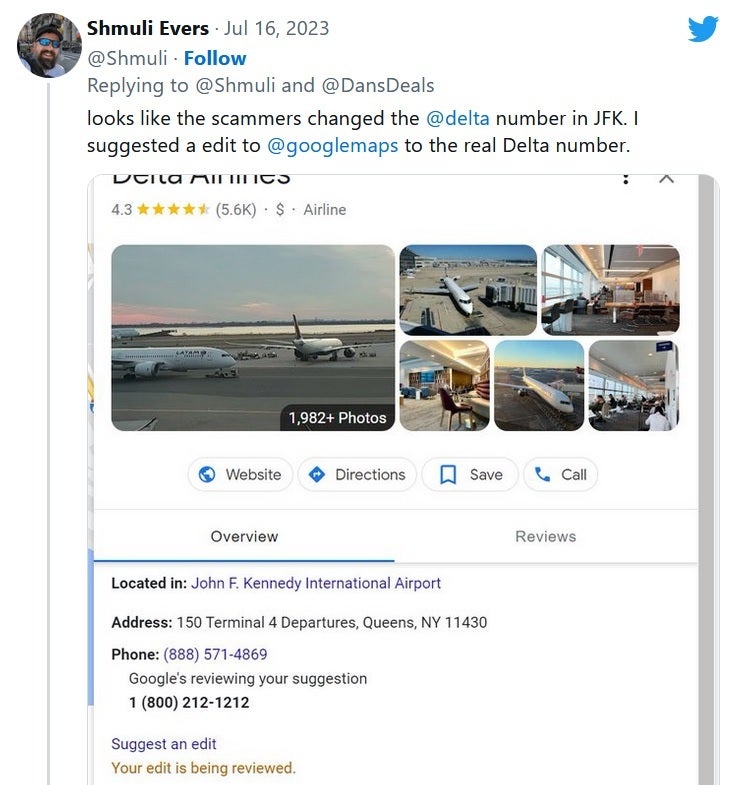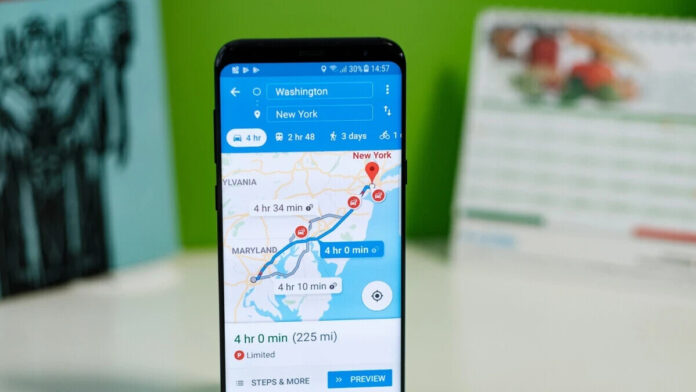Google Maps has matured into an extremely useful app that does much more than just help you navigate quickly, but safely, from point “A” to point “B.” And once you get to point “B,” Google Maps will tell you where to dine, where to shop, where to find entertainment, and where to get a good night’s sleep. The app will also give you the phone number to call when you want to get in touch with a business-like an airline.
Scammers submit fake business numbers to Google Maps to scam users
According to a tweet from UX designer
Shmuli Evers (via
AndroidPolice), it appears as though scammers are replacing the legitimate hotline numbers on Google Maps with their own phone numbers. As Evers relates, his flight on Delta Airlines was canceled. When it became obvious that Delta’s customer service number was swamped, he looked up a hotline number on Google Maps. When the party answered on the other side, Evers started to explain that his flight was canceled and he needed a new flight.
A fake phone number in Google Maps almost made a scam victim out of Schmuli Evers
The call got disconnected and then Evers’ phone rang; he was called from a French phone number and Caller ID showed the name of a person unrelated to Delta Airlines. The person then identified themselves as an airline representative. Shmuli gave his name and the confirmation number of his new flight. He was then directed by the “airline representative” to send the confirmation number of the new flight to another number via SMS. He also was asked to pay for the new flight reservations up front.
Worried that he was the entree in a scam meal, Evers hung up the call only to get bombarded by text asking him to pay five times the price of his original ticket to re-book. It turns out that the phone number from Google Maps that Evers originally called was connected to Delta’s local help desk at John F. Kennedy Airport. He also did some gumshoe work and found wrong numbers for American Airlines in Google Maps. Both numbers have since been corrected. A lot of information found in Google Maps is crowdsourced such as the hours of operation for a business, and hotline numbers.
What might have happened to Evers is that the information he would have texted to the “airline representative,” including the confirmation number for his “paid” replacement flight, would have been used by the scammer or one of his/her operatives to pick up the ticket at the airport where it might have been cashed in, sold, or used. Fake businesses are also popping up on Google Maps including scam locksmiths. Scammers are also calling small businesses saying that they are from Google and will remove their Google Maps listing unless they pay up to cover an ‘unpaid bill.”
A fake call from Verizon
Google could stop crowdsourcing information and leave it to businesses to provide information for Maps, but since many businesses don’t want to deal with providing Google with this data, Maps would lose the ability to provide information about many businesses. So instead, Google continues to receive crowdsourced data.
You could get confronted at any time by a scammer. As I wrote this article, my phone rang and the voice on the other end of the line claimed to belong to a Verizon representative. “How are you doing tonight?” the caller said. Realizing that it was a taped scam call, I responded that my night was not going well and that a safe had fallen on my head from a window above me. “Glad to hear that,” said the voice in a cheerful manner. I hung up.
Had I continued on the call, I probably would have been asked for some personal information designed to hijack my
Verizon account which would have been used to order pricey new iPhone models.
As Shmili Evers discovered, scammers are everywhere. Trust your gut. If something seems odd and doesn’t make sense, you’re probably being scammed.

